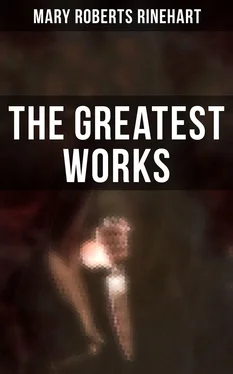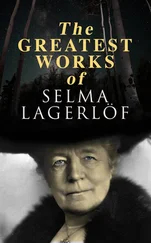"Probably—yes."
"Then toward morning, when everybody was asleep, your theory is that he changed the numbers again and left the train."
"I can't think of anything else," I replied wearily.
"Jove, what a game of bridge that fellow would play! It was like finessing an eight-spot and winning out. They would scarcely have doubted your story had the tags been reversed in the morning. He certainly left you in a bad way. Not a jury in the country would stand out against the stains, the stiletto, and the murdered man's pocket-book in your possession."
"Then you think Sullivan did it?" I asked.
"Of course," said McKnight confidently. "Unless you did it in your sleep. Look at the stains on his pillow, and the dirk stuck into it. And didn't he have the man Harrington's pocket-book?"
"But why did he go off without the money?" I persisted. "And where does the bronze-haired girl come in?"
"Search me," McKnight retorted flippantly. "Inflammation of the imagination on your part."
"Then there is the piece of telegram. It said lower ten, car seven. It's extremely likely that she had it. That telegram was about me, Richey."
"I'm getting a headache," he said, putting out his cigarette against the sole of his shoe. "All I'm certain of just now is that if there hadn't been a wreck, by this time you'd be sitting in an eight by ten cell, and feeling like the rhyme for it."
"But listen to this," I contended, as he picked up his hat, "this fellow Sullivan is a fugitive, and he's a lot more likely to make advances to Bronson than to us. We could have the case continued, release Bronson on bail and set a watch on him."
"Not my watch," McKnight protested. "It's a family heirloom."
"You'd better go home," I said firmly. "Go home and go to bed. You're sleepy. You can have Sullivan's red necktie to dream over if you think it will help any."
Mrs. Klopton's voice came drowsily from the next room, punctuated by a yawn. "Oh, I forgot to tell you," she called, with the suspicious lisp which characterizes her at night, "somebody called up about noon, Mr. Lawrence. It was long distance, and he said he would call again. The name was"—she yawned—"Sullivan."
Chapter XII.
The Gold Bag
Table of Contents
I have always smiled at those cases of spontaneous combustion which, like fusing the component parts of a seidlitz powder, unite two people in a bubbling and ephemeral ecstasy. But surely there is possible, with but a single meeting, an attraction so great, a community of mind and interest so strong, that between that first meeting and the next the bond may grow into something stronger. This is especially true, I fancy, of people with temperament, the modern substitute for imagination. It is a nice question whether lovers begin to love when they are together, or when they are apart.
Not that I followed any such line of reasoning at the time. I would not even admit my folly to myself. But during the restless hours of that first night after the accident, when my back ached with lying on it, and any other position was torture, I found my thoughts constantly going back to Alison West. I dropped into a doze, to dream of touching her fingers again to comfort her, and awoke to find I had patted a teaspoonful of medicine out of Mrs. Klopton's indignant hand. What was it McKnight had said about making an egregious ass of myself?
And that brought me back to Richey, and I fancy I groaned. There is no use expatiating on the friendship between two men who have gone together through college, have quarreled and made it up, fussed together over politics and debated creeds for years: men don't need to be told, and women can not understand. Nevertheless, I groaned. If it had been any one but Rich!
Some things were mine, however, and I would hold them: the halcyon breakfast, the queer hat, the pebble in her small shoe, the gold bag with the broken chain—the bag! Why, it was in my pocket at that moment.
I got up painfully and found my coat. Yes, there was the purse, bulging with an opulent suggestion of wealth inside. I went back to bed again, somewhat dizzy, between effort and the touch of the trinket, so lately hers. I held it up by its broken chain and gloated over it. By careful attention to orders, I ought to be out in a day or so. Then—I could return it to her. I really ought to do that: it was valuable, and I wouldn't care to trust it to the mail. I could run down to Richmond, and see her once—there was no disloyalty to Rich in that.
I had no intention of opening the little bag. I put it under my pillow—which was my reason for refusing to have the linen slips changed, to Mrs. Klopton's dismay. And sometimes during the morning, while I lay under a virgin field of white, ornamented with strange flowers, my cigarettes hidden beyond discovery, and Science and Health on a table by my elbow, as if by the merest accident, I slid my hand under my pillow and touched it reverently.
McKnight came in about eleven. I heard his car at the curb, followed almost immediately by his slam at the front door, and his usual clamor on the stairs. He had a bottle under his arm, rightly surmising that I had been forbidden stimulant, and a large box of cigarettes in his pocket, suspecting my deprivation.
"Well," he said cheerfully. "How did you sleep after keeping me up half the night?"
I slid my hand around: the purse was well covered.
"Have it now, or wait till I get the cork out?" he rattled on.
"I don't want anything," I protested. "I wish you wouldn't be so darned cheerful, Richey." He stopped whistling to stare at me.
"'I am saddest when I sing!" he quoted unctuously. "It's pure reaction, Lollie. Yesterday the sky was low: I was digging for my best friend. To-day—he lies before me, his peevish self. Yesterday I thought the notes were burned: to-day—I look forward to a good cross-country chase, and with luck we will draw." His voice changed suddenly. "Yesterday—she was in Seal Harbor. To-day—she is here."
"Here in Washington?" I asked, as naturally as I could.
"Yes. Going to stay a week or two."
"Oh, I had a little hen and she had a wooden leg
And nearly every morning she used to lay an egg—"
"Will you stop that racket, Rich! It's the real thing this time, I suppose?"
"She's the best little chicken that we have on the farm
And another little drink won't do us any harm—"
he finished, twisting out the corkscrew. Then he came over and sat down on the bed.
"Well," he said judicially, "since you drag it from me, I think perhaps it is. You—you're such a confirmed woman-hater that I hardly knew how you would take it."
"Nothing of the sort," I denied testily. "Because a man reaches the age of thirty without making maudlin love to every—"
"I've taken to long country rides," he went on reflectively, without listening to me, "and yesterday I ran over a sheep; nearly went into the ditch. But there's a Providence that watches over fools and lovers, and just now I know darned well that I'm one, and I have a sneaking idea I'm both."
"You are both," I said with disgust. "If you can be rational for one moment, I wish you would tell me why that man Sullivan called me over the telephone yesterday morning."
"Probably hadn't yet discovered the Bronson notes—providing you hold to your theory that the theft was incidental to the murder. May have wanted his own clothes again, or to thank you for yours. Search me: I can't think of anything else." The doctor came in just then.
As I said before, I think a lot of my doctor—when I am ill. He is a young man, with an air of breezy self-confidence and good humor. He looked directly past the bottle, which is a very valuable accomplishment, and shook hands with McKnight until I could put the cigarettes under the bedclothes. He had interdicted to bacco. Then he sat down beside the bed and felt around the bandages with hands as gentle as a baby's.
Читать дальше












